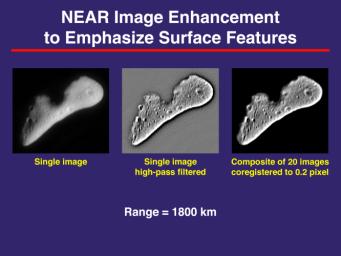
|
Eros Details Enhanced by Computer Processing
- Click the image above for a larger view
- Full-Res JPEG (1500 x 1125) (125.3 kB)
- Full-Res TIFF (1500 x 1125) (817.3 kB)
Caption:
The NEAR camera's ability to show details of Eros's surface is limited by the spacecraft's distance from the asteroid. That is, the closer the spacecraft is to the surface, the more that details are visible. However mission scientists regularly use computer processing to squeeze an extra measure of information from returned data. In a technique known as "superresolution," many images of the same scene acquired at very, very slightly different camera pointing are carefully overlain and processed to bright out details even smaller than would normally be visible. In this rendition constructed out of 20 image frames acquired Feb. 12, 2000, the images have first been enhanced ("high-pass filtered") to accentuate small-scale details. Superresolution was then used to bring out features below the normal ability of the camera to resolve.
Background Info:
Built and managed by The Johns Hopkins University Applied Physics Laboratory, Laurel, Maryland, NEAR was the first spacecraft launched in NASA's Discovery Program of low-cost, small-scale planetary missions. See the NEAR web page at http://near.jhuapl.edu for more details.
Cataloging Keywords:
| Name | Value | Additional Values |
|---|---|---|
| Target | 433 Eros | |
| System | Near Earth Objects | |
| Target Type | Asteroid | |
| Mission | NEAR Shoemaker | |
| Instrument Host | NEAR Shoemaker | |
| Host Type | Orbiter | |
| Instrument | Multi-Spectral Imager (MSI) | |
| Detector | ||
| Extra Keywords | Color | |
| Acquisition Date | ||
| Release Date | 2000-05-07 | |
| Date in Caption | 2000-02-12 | |
| Image Credit | NASA/JPL/JHUAPL | |
| Source | photojournal.jpl.nasa.gov/catalog/PIA02466 | |
| Identifier | PIA02466 | |
